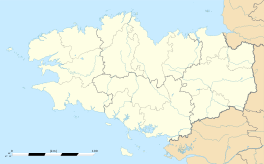Sainte-Anne-d'Auray
|
Sainte-Anne-d'Auray Santez-Anna-Wened |
||
|---|---|---|

|
||
|
||
| Coordinates: 47°42′15″N 2°57′10″W / 47.7042°N 2.9528°WCoordinates: 47°42′15″N 2°57′10″W / 47.7042°N 2.9528°W | ||
| Country | France | |
| Region | Brittany | |
| Department | Morbihan | |
| Arrondissement | Lorient | |
| Canton | Auray | |
| Intercommunality | Pays d'Auray | |
| Government | ||
| • Mayor (2008—2014) | Roland Gastine | |
| Area1 | 4.97 km2 (1.92 sq mi) | |
| Population (1999)2 | 1,844 | |
| • Density | 370/km2 (960/sq mi) | |
| Time zone | CET (UTC+1) | |
| • Summer (DST) | CEST (UTC+2) | |
| INSEE/Postal code | 56263 /56400 | |
| Elevation | 36–57 m (118–187 ft) | |
|
1 French Land Register data, which excludes lakes, ponds, glaciers > 1 km² (0.386 sq mi or 247 acres) and river estuaries. 2Population without double counting: residents of multiple communes (e.g., students and military personnel) only counted once. |
||
1 French Land Register data, which excludes lakes, ponds, glaciers > 1 km² (0.386 sq mi or 247 acres) and river estuaries.
Sainte-Anne-d'Auray (Breton: Santez-Anna-Wened) is a commune in the Morbihan department of Brittany in north-western France.
Inhabitants of Sainte-Anne-d'Auray are called in French Saintannois.
In 2008, 10,82% of all children in the area attended bilingual schools in primary education.
The most notable feature of the village is the large Basilica of Sainte-Anne d'Auray, which is a major site of pilgrimage. Saint Anne is the patron saint of Brittany. The Basilica was built in the mid-nineteenth century to replace an earlier church which had housed an ancient statue of Anne. The statue was said to have been miraculously discovered by Yves Nicolazic, a local peasant, who claimed to have had visions from the saint asking him to build a church in her honour. The statue was destroyed during the French Revolution. In the gardens is a large war memorial to Breton victims of World War I, containing sculptures by Jules-Charles Le Bozec. A large statue of Henri, comte de Chambord, the last significant Bourbon claimant to the monarchy of France, is at the end of the road leading to the now-disused railway station.
Basilica
memorial to Breton victims of World War I
...
Wikipedia



